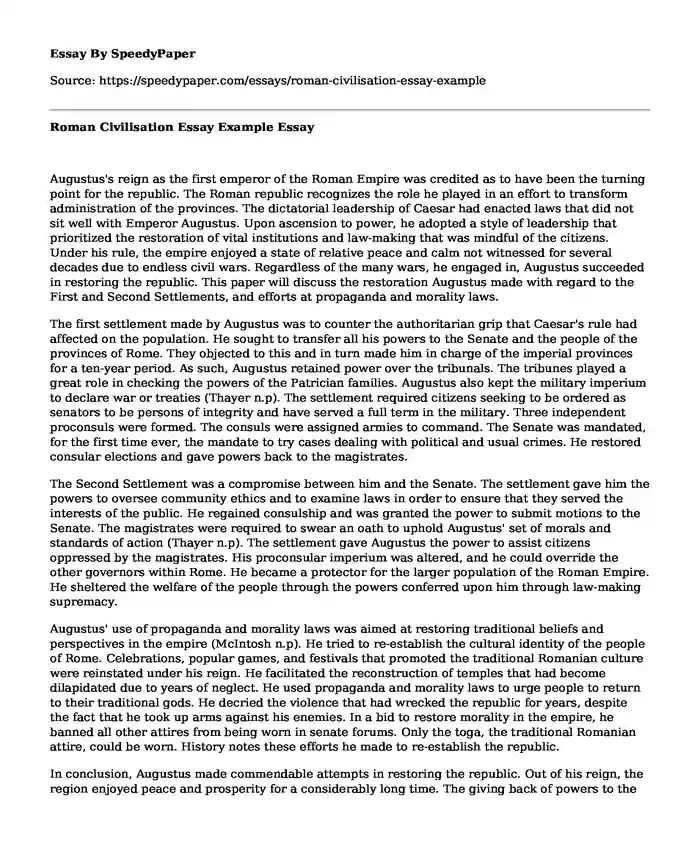Augustus's reign as the first emperor of the Roman Empire was credited as to have been the turning point for the republic. The Roman republic recognizes the role he played in an effort to transform administration of the provinces. The dictatorial leadership of Caesar had enacted laws that did not sit well with Emperor Augustus. Upon ascension to power, he adopted a style of leadership that prioritized the restoration of vital institutions and law-making that was mindful of the citizens. Under his rule, the empire enjoyed a state of relative peace and calm not witnessed for several decades due to endless civil wars. Regardless of the many wars, he engaged in, Augustus succeeded in restoring the republic. This paper will discuss the restoration Augustus made with regard to the First and Second Settlements, and efforts at propaganda and morality laws.
The first settlement made by Augustus was to counter the authoritarian grip that Caesar's rule had affected on the population. He sought to transfer all his powers to the Senate and the people of the provinces of Rome. They objected to this and in turn made him in charge of the imperial provinces for a ten-year period. As such, Augustus retained power over the tribunals. The tribunes played a great role in checking the powers of the Patrician families. Augustus also kept the military imperium to declare war or treaties (Thayer n.p). The settlement required citizens seeking to be ordered as senators to be persons of integrity and have served a full term in the military. Three independent proconsuls were formed. The consuls were assigned armies to command. The Senate was mandated, for the first time ever, the mandate to try cases dealing with political and usual crimes. He restored consular elections and gave powers back to the magistrates.
The Second Settlement was a compromise between him and the Senate. The settlement gave him the powers to oversee community ethics and to examine laws in order to ensure that they served the interests of the public. He regained consulship and was granted the power to submit motions to the Senate. The magistrates were required to swear an oath to uphold Augustus' set of morals and standards of action (Thayer n.p). The settlement gave Augustus the power to assist citizens oppressed by the magistrates. His proconsular imperium was altered, and he could override the other governors within Rome. He became a protector for the larger population of the Roman Empire. He sheltered the welfare of the people through the powers conferred upon him through law-making supremacy.
Augustus' use of propaganda and morality laws was aimed at restoring traditional beliefs and perspectives in the empire (McIntosh n.p). He tried to re-establish the cultural identity of the people of Rome. Celebrations, popular games, and festivals that promoted the traditional Romanian culture were reinstated under his reign. He facilitated the reconstruction of temples that had become dilapidated due to years of neglect. He used propaganda and morality laws to urge people to return to their traditional gods. He decried the violence that had wrecked the republic for years, despite the fact that he took up arms against his enemies. In a bid to restore morality in the empire, he banned all other attires from being worn in senate forums. Only the toga, the traditional Romanian attire, could be worn. History notes these efforts he made to re-establish the republic.
In conclusion, Augustus made commendable attempts in restoring the republic. Out of his reign, the region enjoyed peace and prosperity for a considerably long time. The giving back of powers to the Senate and the people of Rome was a sign of restoration of the republic. By retaining the overall imperium over the armies, he ensured that ambitious elements within the armies would not initiate civil wars against the authorities or the public. He had the interests of the people at heart and even protected them against unfair judicial treatment.
Works Cited
Thayer, E "Suetonius Life of Augustus." Penelope.uchicago.edu. 2013. enelope.uchicago.edu/Thayer/E/Roman/Texts/Suetonius/12Caesars/Augustus/html. Accessed on 10 Apr. 2018.
McIntosh, Matthew. "Augustus: The use of Propaganda to Establish and Maintain Legitimacy and Power." Brewminate, 2016.
Cite this page
Roman Civilisation Essay Example. (2022, May 09). Retrieved from https://speedypaper.net/essays/roman-civilisation-essay-example
Request Removal
If you are the original author of this essay and no longer wish to have it published on the SpeedyPaper website, please click below to request its removal:
- Essay Example on Cyber Attacks
- Free Essay Sample on Courage and Calling
- Ethical Dilemma Case Study Related to the Ads with Gay and Lesbian Inclusion
- Essay Example: The New Volunteer Workforce
- Essay Sample on Twitter and Society: Structural Layers of Communication on Twitter
- Free Essay: Health History and Assessing the Determinants of Health
- US History Cookbook Review
Popular categories





